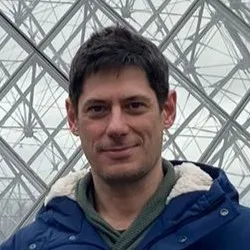- Accueil >
- Liste Annuaire >
- GUILLAUME BORT
Fonctions au sein de l’Institut Curie
Chercheur permanent
Présentation
Guillaume Bort is a chemist working at the interface of biology and physics to develop diagnostic/therapeutic molecules and nanoparticles.
During his PhD (Univ. Paris VI, 2011, supervised by Clotilde Ferroud and Marc Port, and supported by the company Guerbet), he designed Gd-based probes that target β-amyloid aggregates for the early diagnosis of Alzheimer’s disease by MRI. Then he joined the group of Ben Davis at the University of Oxford for a postdoctoral position to develop iron-oxide nanoparticles for MRI and PET (18F-labelled) detection of inflammation by targeting specific receptors on blood vessels or immune system cells (using antibodies and oligosaccharides).
In 2014, he obtained a young-researcher grant from the French National Research Agency (ANR Retour PDoc grant) to come back in France for investigating on the impact of ionizing radiations on various objects (molecules, liposomes, micelles) at the Institut Galien Paris-Saclay (Orsay) in the group of Patrick Couvreur. He joined the CNRS in 2018 as a tenured researcher at the Institute of Light and Matter (Villeurbanne) in the group of Olivier Tillement, to pursue investigations on physical/chemical/biological actions triggered by ionizing radiations, and he developed theranostic prodrug activation and radiosensitizing nanoparticles based on the AGuIX platform currently in clinical trial of phase 2 (NH TherAGuIX).
In 2023, Guillaume Bort moved to the Institut Curie in the Chemistry and Modelling for the Biology of Cancer unit (UMR9187-U1196) in the group of Florence Mahuteau-Betzer. He is now implementing investigations on radiation chemistry to develop new tools adapted to be activated upon radiotherapy. These investigations aim at achieving novel molecular manipulations upon ionizing-radiation, opening the way of high spatiotemporal control at any depth inside the body. Applications in both fundamental research (chemical biology) and therapeutic innovations (cancer) are pursued.
Dernières publications
Journal of Nanobiotechnology - 01/07/2025
International Journal of Radiation Oncology*Biology*Physics - 01/05/2025
Nanoscale - 01/01/2024
Contacter GUILLAUME BORT
Contactez-moi par téléphone ou en renseignant le formulaire ci-dessous
-: 0033169863171


